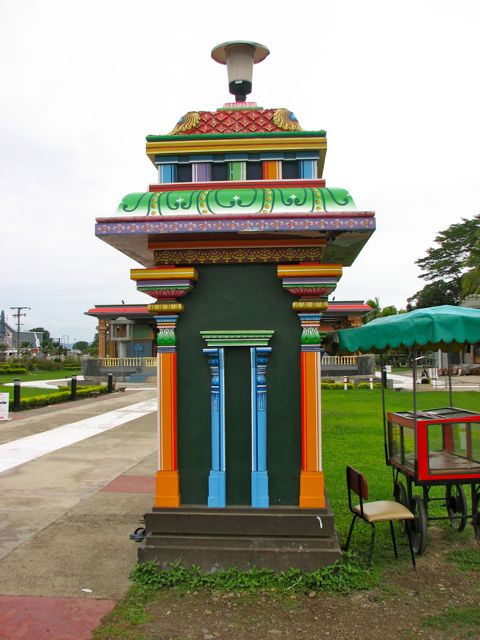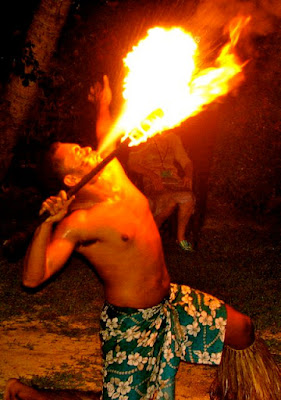Fiji - A salad bowl of cultures - Happy Diwali!
While we are prepping the boat for the hurricane hole
 |
| Mr. Pineapple helping us bag the sails |
we are enjoying the surrounding villages,
 |
| School girls - Shoulders and Knees covered |
amenities of First Landing Resort,
 |
| Our local swimming hole |
and exploration of the culture here in Fiji.
 |
| Fijian Dance |
 |
| Indian Spices and Lentils |
 |
| Alternative to Holy Cows? |
Fiji, population of 860,000, is probably the most interesting of all places we have visited so far and primarily because of its unique mix of cultures and races.
It's not exactly a melting pot, but more of a blended salad bowl of cultures. Each culture maintains a very distinct identity, yet there is also some blending, mostly around holidays and in neighborhoods. Political blending is still an issue, hence the coup a couple of years ago when the Indo-Fijians won the elections, and the Indigenous-Fijians who dominate the military didn't like the results. Currently the democracy has been suspended and is under martial law until 2014.
There are the Indigenous Fijians (predominantly of Melanisan origin), Indo-Fijians (primarily from India, originally brought to Fiji as indentured servants during British rule), Chinese-Fijians, and Other-Fijians (European, NZ, Australia).
Religion plays a dominant role in the lives of the Fijians, and the people are very conservative in their dress. Knees and shoulders are almost always covered. For a warm climate, this can be pretty uncomfortable. At least it is for us Americans who are comfortable in tank tops and shorts, and for sailors who are naked or almost naked in their swim suits most of the time.
The majority of the people on Fiji (52%) are Christian with the largest denomination Methodists capturing 38% of the Christians. Hinduism accounts for 38%,
 |
| Colorful Hindu Temple in Nadi - Cannot enter if you have beef in your belly |
and Islam is 8%.
 |
| Islamic prayer rugs with compass for pointing east |
By my calculations, that leaves about 2% as undeclared or non-religious.
The Indo-Fijians just celebrated Diwali, (a celebration of light during the darkest days of winter - a northern hemisphere celebration that doesn't really apply in the Southern hemisphere, but what the heck). It's a complex story of finding lost love and marks the beginning of the Hindu new year. Every Fijian enjoys Diwali not just the Hindus. The Indo-Fijians wear beautiful saris and robes all week long, the stores are bustling selling fireworks, strings of colorful lights and pottery candles with an off-centered wick. Families busy themselves making sweets to share on Diwali evening with visitors.
We arranged with our marina taxi driver Muhammed, a Muslim, to drive us around on the Friday evening of Diwali to see all of the lights and fireworks. Unbeknownst to us (Russ and me, Susie and David on Sidewinder), Muhammed made arrangements with some of his Hindu friends, the Prasad family, to go to their home, meet them and celebrate Diwali with them. Muhammed picked us up at 7:30 p.m. just at dusk and we drove towards the city of Nadi.
Before reaching Nadi, Muhammed took us on a dirt road that looked as if it should have only been attempted with a four wheel drive. We drove about 1/2 a mile up and down a few hills and arrived at a modest little house on a hillside. The family met us at the door introducing themselves and shaking our hands. The family consisted of parents (most likely in their fifties) a son and his wife and two small children under three, and a teenage daughter just finishing high school. We also met a grandfather who didn't speak much English.
We were invited to sit down in their living room where they had constructed a Diwali shrine
to celebrate the holiday, and we were served "sweets" and a hot sweet milk.
We visited and learned that the daughter was starting Form 7, which corresponds with second semester senior year in America.
 |
| Add caption |
She hoped to go New Zealand and study culinary art when she was finished. The Saturday following the Diwali celebration, the family prays to the cows which are considered holy and the "mothers" as they produce milk.
 |
| Lucky Holy Cows |
During our visit, we also learned that this particular family also likes to celebrate Christmas because it's fun. They don't have Santa, but they do cut down and decorate a pine tree and exchange gifts.
While we were visiting on the inside,
the older father, grandfather, and Muhammed were on the front porch sitting cross-legged, drinking kava (Fijian social ritual). Russ and I had yet to try Kava and were invited to do so. I think one must acquire a taste for it because it's very earthy tasting (dirty water).
 |
| Roz's First and Last Kava |
 |
| Russ and Muhammed |
Kava root is a gift visitors bring to the chief of a village for acceptance and protection in the village while staying. The chief invites the visitor to partake in a Kava ceremony if accepted. In days of old, the women would chew the root and pulverize it with their saliva then spit it into a bowl and it was mixed with water. The liquid has some topical anesthetic properties (numbs the lips and mouth) and if enough is consumed as some depressing/lethargy characteristics. It's not an alcohol, but more like a mild drug. Today, those who wish to partake in Kava usually buy a powder or grind up the root with something other than their women's jaws.
We said our goodbyes and thank yous. It was a wonderful experience. We were so appreciative of Muhammed's thoughtfulness in arranging this visit. Afterwards, he took us into Nadi to see the city lights and that of the Hindu temple.
As a thank you to Muhammed and our Hindu hosts, we printed off a set of photographs and sent some toys for the children.
 |
| Prasad Family celebrating Diwali |
Upon reflection, we realized what a remarkable cultural experience we as Americans had had to be taken to a Hindu Home by a Muslim to share Diwali, and to participate in the Fijian ritual of drinking
Kava.
Our taxi cab driver has invited us to his home next week to celebrate the Islamic holiday of Eid al-Adha, the festival of sacrafice. I think Muhammed's family plans to sacrafice a bull. Quite a contrast to the saving and praying to the holy cow. Yes, Fiji is an interesting mix of cultures.
.

































































